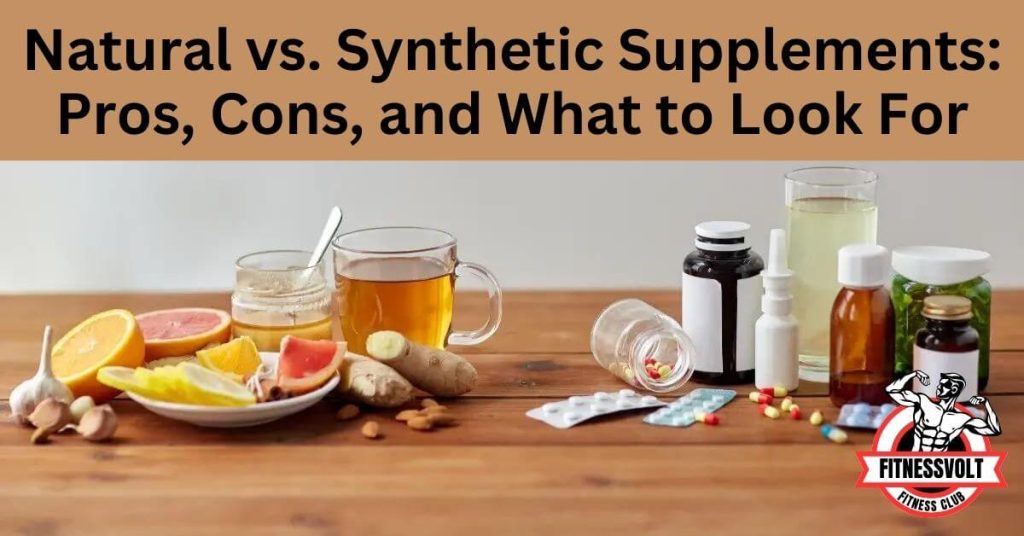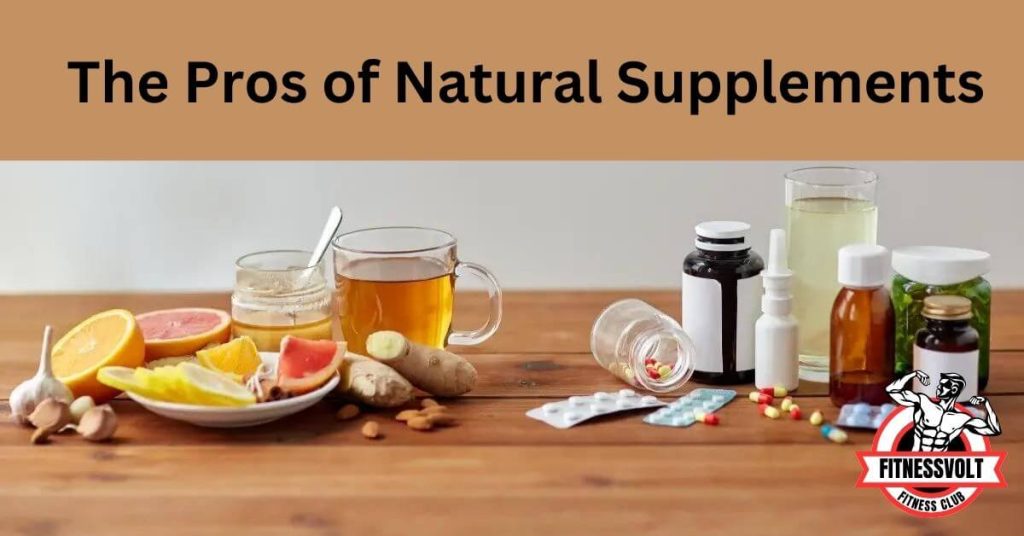Selecting the best shield can feel a bit like dodging through a labyrinth Because there are so many choices available natural, synthetic, or a combination of the two it is easy to become confused. However, fear not, as we are here to explain exactly how natural and synthetic supplements differ in their benefits and drawbacks, and what you should be looking for when shopping for the right one.

What Are Natural Supplements?
Selecting the best shield can feel a bit like dodging through a labyrinth Because there are so many choices available natural, synthetic, or a combination of the two it is easy to become confused. However, fear not, as we are here to explain exactly how natural and synthetic supplements differ in their benefits and drawbacks, and what you should be looking for when shopping for the right one.
What Are Synthetic Supplements?
Basically, there are natural supplements made from organic ingredients and others are synthetic and created in a lab using chemical processes. Created to resemble the molecular composition of natural nutrients. Although obviously, are they exactly like whole food sources, which contain additional compounds beyond the vitamins and minerals that are present in their bioengineered versions?
The Pros of Natural Supplements

Best Supplements:- Lately, people have been trending towards the use of natural supplements for a reason. Below are some of the benefits they offer:
Derived from Whole Food Sources
Typically, natural supplements are made with ingredients from plants, minerals, and animal byproducts. This means that they may contain a complex nutrient profile and may have interactions that can work together to promote health.
Fewer Chemical Additives
When it comes to the natural supplement, it is in its more original form as opposed to other synthetic ingredients so there are fewer fillers, preservatives coloring, etc. This means less exposure to harmful chemicals.
Higher Bioavailability
Bioavailability is the degree of absorption and utilization of nutrients by the body. Not only that but many whole foods and other natural supplements generally have a higher bioavailability, which means they are absorbed better by the body.
Reduced Risk of Side Effects
Due to natural supplements containing fewer man-made chemicals and being more reminiscent of what we would get through a healthy diet, they are mostly believed to be less likely to cause side effects.
The Cons of Natural Supplements
While they offer some advantages, natural supplements are not flawless. These include:
Variability in Potency
The level of active ingredients in natural supplements may depend on the source and methods of processing. It makes it more difficult to ensure that a person receives the same dose each time.
Higher Cost
It is not uncommon for natural supplements to be a little bit more expensive. When sourcing the best whole food ingredients and processing them so their vitamins and minerals are not destroyed in the process, to do this is actually fairly costly.
Limited Availability
This is because not all nutrients exist in nature. Sometimes, to have a complete set of vitamins and minerals we need artificial vitamin supplements.
The Pros of Synthetic Supplements
There are also several benefits to synthetic supplements that make them attractive:
Consistency in Dosage
Synthetic supplements, on the other hand, are created in laboratories, meaning that every pill or capsule contains approximately the same dosage. This is useful for people looking to keep a clear idea of what they consume while on a diet.
Cost-Effectiveness
Generally, the synthetic supplements tend to be cheaper than their natural chemical counterparts. They are mass-produced, which makes them cheaper for consumers.
Accessibility and Variety
Not everybody enjoys the taste of kale and exercises enough or has the time to cook all these superfoods, that is where synthetic supplements come in, which are very accessible in terms of availability but also in different forms such as pills, powders, and liquids.
The Cons of Synthetic Supplements
Still, not all synthetic supplements are great:
Potential for Chemical Additives
Some people also steer clear of fillers, binders, and artificial colors in these synthetic supplements since they may pose a health risk.
Lower Bioavailability
This is because some synthetic vitamins are not as bio-available when compared to their natural counterpart. The body may not be as in tune to processed vitamins where synthesized from whole foods.
Possible Side Effects
Some artificial supplements can produce side effects like nausea and headaches, or even toxic to your organs or can cause deadly complications when taken in large doses.
Key Factors to Consider When Choosing Supplements

There is much more to choosing proper supplement intake than just natural or synthetic. Zillion Things to Consider:
Your Individual Health Needs
Think about what you might be deficient in your diet or what you want to improve health-wise. This could mean that a dairy free person might need calcium supplements, or an athlete may require more protein.
The Source and Quality of Ingredients
Think about what you might be deficient in your diet or what you want to improve health wise. This could mean that a dairy-free person might need calcium supplements, or an athlete may require more protein.
Third-Party Testing and Certification
Those supplements may have been verified by other organizations. This would give an extra assurance about the product’s quality and safety.
Understanding Labels and Dosages
Take care to read the labels so you can understand what the recommended dose is, and how much of your daily value each serving will give you. But you will be at risk of taking too much, even if it is only in supplement form.
Popular Natural Supplements and Their Benefits
However, for those of you searching for natural supplements instead, there are a couple of popular ones that cost in on:
Herbal Supplements
Naturally, occurring herbs such as turmeric, ginger, and ginseng all come from root plants and are used for their healing benefits. They can help treat inflammation and fatigue.
Vitamins and Minerals from Whole Foods
These are natural vitamins and minerals extracted from foods (real fruits, vegetables, etc.); meaning they contain a similar nutrient profile to what you would find in nature.
Probiotics and Fermented Products
Fermented foods like yogurt, kefir, and sauerkraut have natural probiotics that can aid gut health.
Popular Synthetic Supplements and Their Benefits
The following are a few of the more popular synthetic supplements, in case they better meet your needs.
Synthetic Vitamins and Their Uses
Synthetic vitamins such as vitamins C and D are made to target slight deficiencies or health conditions. These are usually more concentrated and easier to take in pill form.
Lab-Made Amino Acids and Proteins
Athletes and bodybuilders frequently use synthetic amino acids/proteins to assist in muscle repair and growth. They are meant to go into the body very well.
Fortified Foods and Drinks
Most commercialized, processed versions of food and drink have synthetic vitamins and minerals added to help make it easier for people to get the nutrients they need.
How to Determine the Right Supplement for You
Choosing the perfect supplement is sometimes a personal quest. That is the way you can decide definitively:
Consulting with Healthcare Professionals
Consult with a physician or nutritionist before using any supplement. They can give you individual advice on your current situation and health history.
Researching and Reading Reviews
This means reading through user reviews and scientific research to gauge the efficacy and safety of the supplements you are thinking about.
Testing Your Body’s Response
All bodies are different. Take a lower dose initially and note the effects on how it makes you feel. If you do experience any side effects, discontinue the supplement and speak to a doctor.
Common Myths About Natural and Synthetic Supplements
You find a lot of myths about supplements out there. Here we debunk some common myths :
Myth 1: Natural Supplements Are Always Better
Natural supplements may be more absorbable, but they are not always more or less effective and safe compared to synthetics. This will vary by the specific nutrient and age of the pecan.
Myth 2: Synthetic Supplements Are Harmful
By the way, I mean not every man-made supplement is harmful. Most are safe, and they work well if you get a high-quality version of the supplement and use it.
Myth 3: Supplements Can Replace a Healthy Diet
Supplements are meant to supplement your diet, not replace it. Remember, the key here is to consume a variety of nutrients like whole foods which come from all the food groups.
Conclusion
The Bottom Line on Natural vs Synthetic Supplements Choosing between natural or synthetic supplements should not have to be difficult. Knowing the good and bad of each, thinking about your health goals, and researching will help you to decide which product is beneficial in maintaining your health.


